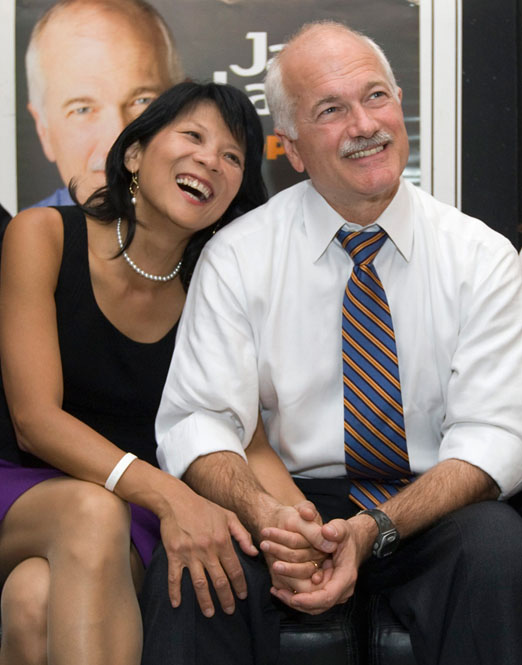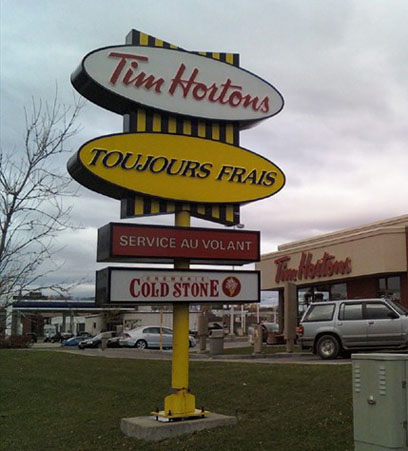Key current campaigns : Olivia Chow, Alex Mazer, and Richard Underhill in Toronto, and Tim Hortons in Quebec
Mar 18th, 2014 | By Randall White | Category: In Brief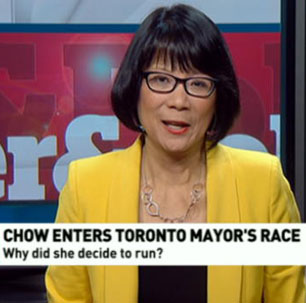 At least some people are talking about how interesting the Quebec provincial election campaign has suddenly become. See, eg : “Marois says rest of Canada would be welcome to visit independent Quebec” ; “Independent Quebec would keep Canadian dollar, Marois says” ; “Marois tells Canada not to be afraid of Quebec election outcome” ; “Naked Quebec election candidate gets lots of exposure.”
At least some people are talking about how interesting the Quebec provincial election campaign has suddenly become. See, eg : “Marois says rest of Canada would be welcome to visit independent Quebec” ; “Independent Quebec would keep Canadian dollar, Marois says” ; “Marois tells Canada not to be afraid of Quebec election outcome” ; “Naked Quebec election candidate gets lots of exposure.”
Or, still more recently : “Pierre Karl Péladeau and Julie Snyder: Match made in sovereigntist heaven?” ; “Quebecers should look at balance sheet before they anoint Pierre Karl Peladeau as economic saviour” ; “As Reform MP, Harper felt simple majority enough to decide a referendum” ; and (for the latest real truth, from the horses’s mouth etc) : “Intentions de vote: avec PKP, «on va remonter», dit Marois … La chef du PQ est persuadée de ne pas avoir fait le plein d’intentions de vote. «On va remonter!» a-t-elle lancé à des militants inquiets du dernier coup de sonde attablés dans un Tim Hortons de Boucherville.”
Here in Toronto, where almost nothing important in Canada ever happens any more (in the Age of Stephen Harper??), we also have reasons to suspect that what Senator Hugh Segal calls “Quebec’s capacity to energize” and inspire public debate in other parts of the country has already started its good work.
I agree, that is to say : Naheed Nenshi in Calgary is the most interesting mayor in all of Canada today. But this past week we’ve learned that Olivia Chow really is in the race for Mayor of Toronto which will not be decided until October 27 – still more than seven months away.
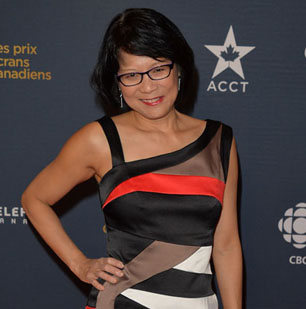
Olivia at night – also an antidote to the critical theory that, unlike Rob Ford, the left is too staid, puritanical, and boring. (Image: Courtesy of the Canadian Screen Awards.)
As someone who will be voting this fall, I should confess a predisposition to Ms Chow. But I have now had a chance to catch up with her performance at the formal launch of her campaign this past Thursday, “in a downtown church, just blocks from where she grew up as a child.”
It still seems unclear to me just what she might prove to be as mayor. I was nonetheless impressed by something in her Thursday performance. And who knows? A new Age of Mayor Chow could prove quite interesting, perhaps even intermittently on US TV. (“We are Toronto. This is our city, yours and mine … and we can make it better by working together,” etc, etc. Moreover : “Chow has early lead in Toronto’s mayoral race, new poll suggests.”)
1. Can Olivia do it? (And what about Alex Mazer and Richard Underhill?)
To get right down to the essential argument, Rob Ford is a man of the Old Toronto, who actually knows some people from the New Toronto, and has some appeal in this direction. Olivia Chow IS the New Toronto. And she gets points with many in the Old Toronto for her marriage to the late great Jack Layton, a later-in-life Torontonian from Old Montreal.
While not as beguilingly cute as she was “in her early days as a Toronto school-board trustee in the mid to late 1980s,” Olivia has her own populist message and a coy sense of humour which could have significant mass appeal. (And btw many of her campaign signs put “OLIVIA” in big letters and “Chow” in small ones.)
Yet it is not just Olivia Chow, or Rob Ford, or John Tory, or Karen Stintz, or even David Soknacki who are making the 2014 Toronto municipal election campaign interesting. Two among the vast mass of less publicly visible candidates, eg, also show how the new world introduced in Robyn Doolittle’s book Crazy Town: The Rob Ford Story has started to blossom in many different parts of Toronto, and perhaps many other Canadian places too. (And certainly in Calgary, which already has Mayor Nenshi.)
The first more obscure candidate of this sort is the Ontario Liberal policy guru, Alex Mazer, who is just running for city councillor in ward 18. The second is the Juno-Award-winning Canadian jazz musician Richard Underhill, who has “toured to over 30 countries” and is intriguingly if not entirely convincingly running for Mayor of Toronto this year, bolstered by the slogan “May the best PLAN win.”
Oh and btw, about that Tim Hortons where Pauline Marois was talking recently in the very, very francophone place of Boucherville, Quebec. (See the quotation in French above.)
It does seem to me that if there actually are hundreds of Tim Hortons coffee shops in Quebec (and especially in very, very francophone places, granting that Boucherville is also a suburb of Montreal), the whole idea of Quebec being altogether separate from and independent of Canada really makes even less sense now than it did in 1980 or 1995. Here as in such similar subjects as hockey, les Quebecois still show that they are as lamentably Canadian as the rest of us.
2. “Thick briefing books … prepared by young policy thinkers like Alex Mazer”
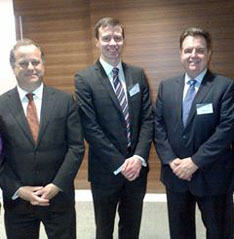
Alex Mazer (centre) with New Democrat Brian Topp (left) and Liberal Dwight Duncan (right) – a man with important friends.
Alex Mazer is almost certainly a more serious candidate in the October 27, 2014 Toronto election – ie with a more realistic chance of actually being elected – than Richard Underhill. (Partly because he’s only trying to become a city councillor for one of the city’s 44 wards, not an alleged chief executive for the city at large.) But in the end I find him somewhat less interesting than Richard Underhill. (Partly because I am already a fan of Richard Underhill the local jazz virtuoso, no doubt.)
I think the best I can do on Alex Mazer here, for the moment, is cite Jonathan Goldsbie’s January 6, 2014 assessment in NOW magazine (Toronto’s now quite established left-wing free tabloid) : “Alex Mazer (running for councillor, ward 18): Mazer is a Harvard-educated lawyer, former director of policy for Ontario finance minister Dwight Duncan, and professional management consultant. He is also a co-founder of Better Budget TO, an initiative to create broader and more meaningful public engagement in the municipal budget process. His resumé is exquisite, though [?it?] omits mention of his work on Michael Ignatieff’s Liberal leadership campaign. From Ignatieff’s recent [book] Fire And Ashes: ‘It took a year, between October 2004 and December 2005, to engineer my return [to Canada from the US]. During that time, the team that the men in black had promised began to take shape … Thick briefing books on public policy issues – health care, energy, jobs – began to arrive in the mail, prepared by young policy thinkers like Alex Mazer…’ Whether this history works for or against Mazer depends on your perspective. In any case, he’s attempting to run against incumbent Ana Bailão from the left, observing (correctly) that she supported the Ford agenda more often than she probably should have. As things stand now, her seat is reasonably safe, but two days in to the election, this may be the most interesting ward battle.”
3. “The saxophonist-about-Kensington” …”founding member of Toronto’s outrageous Sun Ra influenced Shuffle Demons” …Â “Of ‘Spadina Bus’ fame”
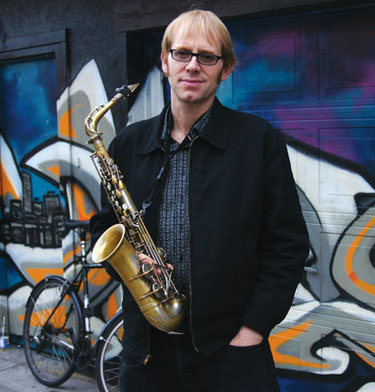
Richard Underhill – “The saxophonist about Kensington” (Jonathan Goldsbie). Photo : Suzanne Johnson, 2007.
Up to now, Richard Underhill – who grew up in Salmon Arm, British Columbia –Â has been familiar to me as a superb alto saxophone player, who I listen to with great admiration (and envy) from time to time, usually at the Rex Hotel on Queen Street West in Toronto.
(The Rex, btw, also used to be the last of the great Canadian draft halls in downtown Toronto. It has now adapted to the dominant upscale pub culture of the early 21st century. But it was an intriguing earlier irony that so long as Toronto really was what the local historian Percy Robinson (1873—1953) called “the citadel of British sentiment in America,” it had no such thing as a British-style pub. Now that it has become so very much more diverse and cosmopolitan, there seem to be British-style pubs everywhere. The 1970s may be the hinge of fate here – though I may also stand to be corrected, by someone as old as I am with a better memory.)
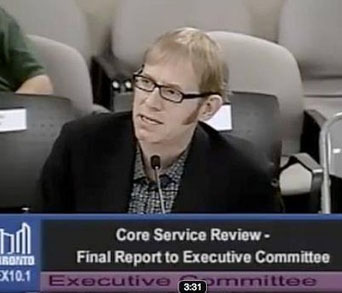
Richard Underhill – local political activist : a jazz musician who cares about good public policy. And how often do you see that?
In any case, the www being the remarkable place it often is, I have found that I have collected far too much material on “Richard Underhill for Mayor … May the best PLAN win” to sensibly include here. I will do an entire piece on all the intriguing additional things I have learned about his public-spirited political career, which I confess has just come to me as something of a great (but quite agreeable) surprise.
This will in fact (I predict) be the first such thing I attend to when I return from the Silicon Valley Country Retreat which many of we counterweights editors are going on this coming March 19 — April 5. Attendance will be so great this year, I am told, that the counterweights editorial office in Toronto will be shut down for the same period – during which no new material will be posted on the site. We need to at last escape this year’s stubborn severe winter, and recharge our batteries in the Mediterranean climate of the Golden State North.
4. O and about that Tim Hortons in Boucherville, Quebec
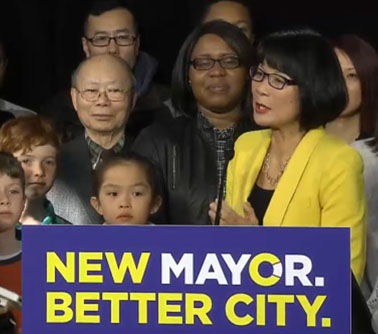 Too much stress is too often placed on Tim Hortons coffee shops as a current Canadian cultural icon. But there is something to the equation. And it is interesting that this is not altogether missing in Quebec. And that Pauline Marois chose a Tim Hortons in a resolutely francophone Montreal suburb to talk about how her initially too-sovereigntist 2014 election campaign was going to “start over” or “get up again” («on va remonter»).
Too much stress is too often placed on Tim Hortons coffee shops as a current Canadian cultural icon. But there is something to the equation. And it is interesting that this is not altogether missing in Quebec. And that Pauline Marois chose a Tim Hortons in a resolutely francophone Montreal suburb to talk about how her initially too-sovereigntist 2014 election campaign was going to “start over” or “get up again” («on va remonter»).
(And note as well : “Boucherville is one of the most homogeneous cities in the Greater Montreal Area. 94% of its residents speak French as their first language. Less than 2% of the entire population is not white, and almost 94% of the population is Roman Catholic.”)
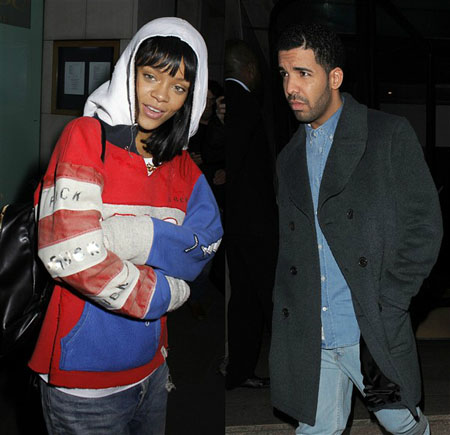
Drake from Toronto and Rihanna from Barbados – another sign of how Toronto is moving ahead, in spite of it all. (Drake is also “global ambassador” for the Toronto Raptors in the NBA.)
There are no doubt limits to how far the Tim-Hortons-in-Quebec syndrome can reach. William Wolfe-Wylie’s piece on the Canada.com site from just over a year ago, on “Where Tim Hortons has room to grow in Canada,” is worth consulting. As he explains : “The entire Halifax, Montreal, Quebec City and Winnipeg areas have lower Tim Hortons densities than other Tims-addicted parts of the country like Surrey, BC, North Bay, Ont., and Ottawa. “
At the same time, according to the same source : “the North-Western corner of Alberta, is the most Tim Hortons-sparse area in the country.” And see such other recent headlines as “Man claims language dispute led to altercation in Tim Hortons; owner sees it differently” ; and “Alberta hangs on to beat Quebec in Tim Hortons Brier semifinal.”
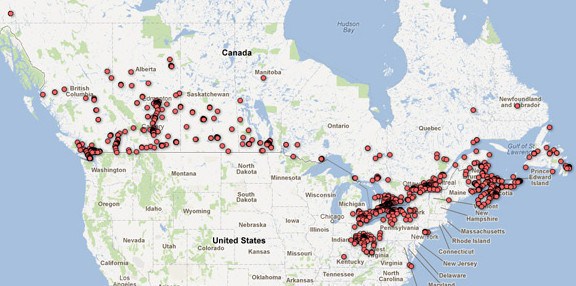
Map of Tim Hortons locations across Canada (and the United States). PHOTO: WILLIAM WOLFE-WYLIE, CANADA.COM.
(And in case you think the Quebec team in this last case is just a lot of Scotsmen from Old Montreal, note that the skip is Jean-Michel Ménard.)
No one wants to exaggerate such things of course. And the present Quebecois intelligentsia often dismiss them altogether. But when you look at all the relevant numbers that are suddenly pouring forth again (and factor in several history books, and what little you know from face-to-face contact with real human beings), there does seem some sense in which the longer the Quebecois nation born in the 1960s looks into the mirror, the more it starts to realize that some still important part of the reflection it gets back has deep Canadian roots. And next year, 2015, will mark the 400th anniversary of Samuel de Champlain’s long journey to the Huron Confederacy in what we now call Southern Ontario.
